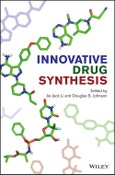- Summarizes for each drug: respective disease area, important properties and SAR (structure-activity relationship), and chemical synthesis routes / options
- Includes case studies in each chapter
- Illustrates how chemistry, biology, pharmacokinetics, and a host of disciplines come together to produce successful medicines
- Explains the advantages of process synthesis versus the synthetic route for drug discovery
Table of Contents
Preface xi
Contributors xiii
PART I. INFECTIOUS DISEASES 1
Chapter 1. Entecavir (Baraclude): A Carbocyclic Nucleoside for the Treatment of Chronic Hepatitis B 3
1 Background 3
2 Pharmacology 5
3 Structure–Activity Relationship (SAR) 6
4 Pharmacokinetics and Drug Metabolism 7
5 Efficacy and Safety 8
6 Syntheses 8
7 References 14
Chapter 2. Telaprevir (Incivek) and Boceprevir (Victrelis): NS3/4A Inhibitors for Treatment for Hepatitis C Virus (HCV) 15
1 Background 16
2 Pharmacology 16
3 Structure–Activity Relationship (SAR) 17
4 PK and Drug Metabolism 20
5 Efficacy and Safety 22
6 Synthesis 24
7 Conclusions 38
8 References 39
Chapter 3. Daclatasvir (Daklinza): The First-in-Class HCV NS5A Replication Complex Inhibitor 43
1 Background 43
2 Discovery Medicinal Chemistry 45
3 Mode of Action 48
4 Pharmacokinetics and Drug Metabolism 49
5 Efficacy and Safety 49
6 Syntheses 52
7 References 57
Chapter 4. Sofosbuvir (Sovaldi): The First-in-Class HCV NS5B Nucleotide Polymerase Inhibitor 61
1 Background 61
2 Pharmacology 63
3 Structure–Activity Relationship (SAR) 64
4 Pharmacokinetics and Drug Metabolism 68
5 Efficacy and Safety 69
6 Syntheses 72
7 Summary 76
8 References 76
Chapter 5. Bedaquiline (Sirturo): A Diarylquinoline that Blocks Tuberculosis ATP Synthase for the Treatment of Multi-Drug Resistant Tuberculosis 81
1 Background 81
2 Pharmacology 84
3 Structure–Activity Relationship (SAR) 85
4 Pharmacokinetics and Drug Metabolism 86
5 Efficacy and Safety 87
6 Syntheses 88
7 References 96
PART II. CANCER 99
Chapter 6. Enzalutamide (Xtandi): An Androgen Receptor Antagonist for Late-Stage Prostate Cancer 101
1 Background 101
2 Pharmacology 103
3 Structure–Activity Relationship (SAR) 104
4 Pharmacokinetics and Drug Metabolism 108
5 Efficacy and Safety 109
6 Synthesis 111
7 Compounds in Development 114
8 References 115
Chapter 7. Crizotinib (Xalkori): The First-in-Class ALK/ROS Inhibitor for Non-small Cell Lung Cancer 119
1 Background: Non-small Cell Lung Cancer (NSCLC) Treatment 119
2 Discovery Medicinal Chemistry Effort: SAR and Lead Optimization of Compound 2 as a c-Met Inhibitor 120
3 ALK and ROS in Non-small Cell Lung Cancer (NSCLC) Treatment 127
4 Preclinical Model Tumor Growth Inhibition Efficacy and Pharmacology 127
5 Human Clinical Trials 128
6 Introduction to the Synthesis and Limitations of the Discovery Route to Crizotinib Analogs 129
7 Process Chemistry: Initial Improvements 131
8 Process Chemistry: Enabling Route to Crizotinib 135
9 Development of the Commercial Process 141
10 Commercial Synthesis of Crizotinib 147
11 References 152
Chapter 8. Ibrutinib (Imbruvica): The First-in-Class Btk Inhibitor for Mantle Cell Lymphoma, Chronic Lymphocytic Leukemia, and Waldenstrom's Macroglobulinemia 157
1 Background 157
2 Pharmacology 159
3 Structure–Activity Relationship (SAR) 159
4 Pharmacokinetics and Drug Metabolism 161
5 Efficacy and Safety 161
6 Syntheses 162
7 References 164
Chapter 9. Palbociclib (Ibrance): The First-in-Class CDK4/6 Inhibitor for Breast Cancer 167
1 Background 167
2 Pharmacology 168
3 Discovery Program 169
4 Preclinical Profile of Palbociclib 175
5 Clinical Profile of Palbociclib 176
6 Early Process Development for Palbociclib 177
7 Commercial Process for Preparation of Palbociclib 192
8 References 193
PART III. CARDIOVASCULAR DISEASES 197
Chapter 10. Ticagrelor (Brilinta) and Dabigatran Etexilate (Pradaxa): P2Y12 Platelet Inhibitors as Anti-coagulants 199
1 Introduction 200
2 Dabigatran Etexilate 200
3 Ticagrelor 207
4 The Future 219
5 References 220
PART IV. CNS DRUGS 223
Chapter 11. Suvorexant (BELSOMRA): The First-in-Class Orexin Antagonist for Insomnia 225
1 Background 225
2 Pharmacology 229
3 Pharmacokinetics and Drug Metabolism 230
4 Efficacy and Safety 231
5 Structure–Activity Relationship (SAR) 231
6 Synthesis 233
7 References 239
Chapter 12. Lorcaserin (Belviq): Serotonin 2C Receptor Agonist for the Treatment of Obesity 243
1 Background 243
2 Pharmacology 245
3 Structure–Activity Relationship (SAR) 246
4 Pharmacokinetics and Drug Metabolism 248
5 Efficacy and Safety 249
6 Synthesis 250
7 References 253
Chapter 13. Fingolimod (Gilenya): The First Oral Treatment for Multiple Sclerosis 255
1 Background 255
2 Structure–Activity Relationship (SAR) 257
3 Pharmacology 259
4 Human Pharmacokinetics and Drug Metabolism 260
5 Efficacy and Safety 261
6 Syntheses 263
7 Summary 268
8 References 269
Chapter 14. Perampanel (Fycompa): AMPA Receptor Antagonist for the Treatment of Seizure 271
1 Background 271
2 Pharmacology 273
3 Structure–Activity Relationship (SAR) 274
4 Pharmacokinetics and Drug Metabolism 276
5 Efficacy and Safety 277
6 Syntheses 278
7 References 280
PART V. ANTI-INFLAMMATORY DRUGS 283
Chapter 15. Tofacitinib (Xeljanz): The First-in-Class JAK Inhibitor for the Treatment of Rheumatoid Arthritis 285
1 Background 285
2 Structure–Activity Relationships (SAR) 287
3 Safety, Pharmacology and Pharmacokinetics 289
4 Syntheses 290
5 Development of the Commercial Manufacturing Process 292
6 References 300
PART VI. MISCELLANEOUS DRUGS 303
Chapter 16. Ivacaftor (Kalydeco): A CFTR Potentiator for the Treatment of Cystic Fibrosis 305
1 Background 305
2 Pharmacology 306
3 Structure–Activity Relationship (SAR) 307
4 Pharmacokinetics and Drug Metabolism 308
5 Efficacy and Safety 310
6 Syntheses 311
7 References 315
Chapter 17. Febuxostat (Uloric): A Xanthine Oxidase Inhibitor for the Treatment of Gout 317
1 Background 317
2 Pharmacology 319
3 Structure–Activity Relationship (SAR) 320
4 Pharmacokinetics and Drug Metabolism 321
5 Efficacy and Safety 322
6 Syntheses 323
7 Drug in Development: Lesinurad Sodium 328
8 References 330
Index 331








